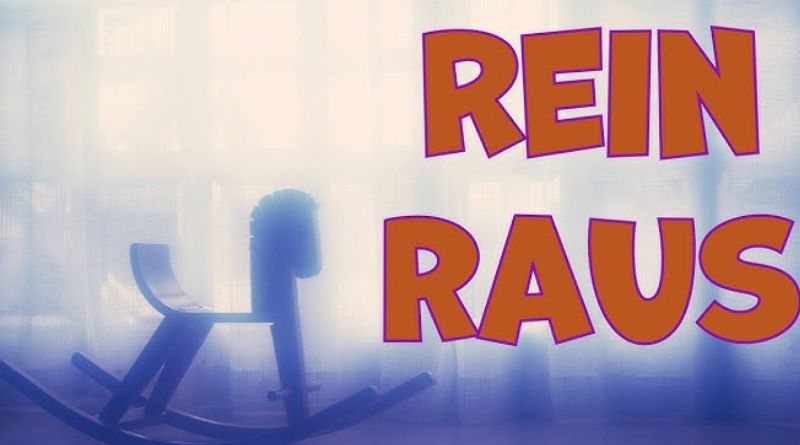Rammstein, a band famous for their intense, heavy industrial metal sound and provocative lyrics, often explores themes of love, sex, power, and controversy. One of their lesser-known tracks, “Rein Raus” from the 2009 album Liebe ist für alle da, continues this tradition. The title itself is a play on words that translates to “In Out” in English, referencing the physical action implied in the lyrics, but with a much deeper thematic significance.
The song “Rein Raus” is often interpreted as a metaphor for the cyclical nature of desire, lust, and sexual relationships. As with many Rammstein songs, the band’s dark humor and theatricality shine through, as they delve into complex human emotions with their signature mix of absurdity and raw intensity.
In this article, we will translate and break down the “Rein Raus” lyrics, explore their deeper meanings, and answer some frequently asked questions regarding the song’s themes and its place in Rammstein’s catalog.
Table of Contents
The Lyrics of “Rein Raus” – English Translation
“Rein Raus” is a song that blends sexual imagery with a satirical look at human nature and relationships. Below is a direct translation of the lyrics:
Rein raus
Rein raus
Rein raus
Rein raus
In out
In out
In out
In out
Ich steh’ auf, sie legt sich hin
Ich leg’ mich hin, sie steht auf
Ich steh’ auf, sie legt sich hin
Ich leg’ mich hin, sie steht auf
I stand up, she lies down
I lie down, she stands up
I stand up, she lies down
I lie down, she stands up
Rein raus
Rein raus
Rein raus
Rein raus
In out
In out
In out
In out
Ich komm’ und du gehst
Du kommst und ich geh’
I come and you go
You come and I go
The repetition of the words “Rein Raus” (In out) throughout the song is not only a literal reference to physical action but also a metaphor for the cyclical nature of desire, push-pull dynamics in relationships, and the emotional or physical exhaustion that can come from them.
Analyzing the Themes of “Rein Raus”
At first glance, “Rein Raus” seems to be a straightforward, sexually charged track with little depth. However, like many of Rammstein’s songs, there’s more than meets the eye. The repetitive nature of the lyrics—“Rein Raus” and the actions described—suggest a cyclical, almost robotic dynamic in a relationship or encounter.
1. The Cyclical Nature of Lust and Desire
The song’s repetition of the action “rein raus” (in and out) can be interpreted as a metaphor for the mechanical nature of sexual relationships, or even the emptiness that can come from repetitive, superficial interactions. The focus on physical actions without deeper emotional connection may be seen as a comment on modern relationships or even societal norms where superficial connections sometimes replace deeper emotional intimacy.
The cyclical pattern—“I stand up, she lies down; I lie down, she stands up”—emphasizes this constant back-and-forth, creating a sense of emptiness or detachment. This movement can be interpreted as a metaphor for emotional or physical exhaustion, where one partner is constantly giving and the other receiving, but neither party truly gains anything substantial.
2. Power Dynamics and Reversal of Roles
The lyrics describing the partners switching positions, with one person standing and the other lying down, could indicate a constant shift in power within the relationship. This back-and-forth can suggest a lack of stability or equality, as one partner alternates between being dominant and submissive.
Rammstein’s lyrics often explore themes of control, submission, and power dynamics within relationships, and “Rein Raus” appears to do so through a blunt, unflinching lens. The song might be commenting on how these roles can be fluid and subject to change, sometimes leading to confusion or a lack of fulfillment.
3. Sexual Liberation vs. Emotional Disconnect
The graphic, almost humorous depiction of physical actions in the song might reflect the disconnect between physical desire and emotional intimacy. The repeated actions—“in out, in out”—can be seen as a metaphor for the fleeting nature of physical pleasure, contrasting it with the absence of deeper emotional connection. It suggests that while sexual liberation and freedom are celebrated, they often come at the cost of emotional intimacy or personal fulfillment.
4. Mocking the Cliché of “Repetitive” Relationships
Rammstein often uses satire to mock societal norms, and in “Rein Raus,” there seems to be an element of mocking the repetitiveness or emptiness in modern relationships, where the “in-out” pattern could represent relationships that lack depth. The song almost seems to say: “Is this all there is?”
This satire can also be interpreted as a commentary on the sexual objectification or commodification of individuals, reducing them to mere physical roles with no emotional significance. This is an ongoing theme in Rammstein’s work, where they often push the boundaries of what’s considered acceptable in music and culture.
The Music: Driving the Song’s Message
Musically, “Rein Raus” carries the characteristic heavy, industrial sound Rammstein is known for. The driving guitar riffs, pounding drums, and constant basslines complement the relentless repetition of the lyrics. The music itself becomes a metaphor for the mechanical nature of the actions described, creating an almost hypnotic effect that mirrors the repetitive actions in the song.
The heavy, thumping beats paired with Till Lindemann’s deep, guttural vocals give the track an aggressive, dark energy. This is balanced by a certain playfulness in the music, reinforcing the fact that the song is meant to be understood not only as a literal narrative but as a satirical commentary on modern sexuality and relationships.
The Song’s Impact and Reception
“Rein Raus” is not as well-known as some of Rammstein’s other tracks, but it has gained attention for its bold and unrestrained lyrics. As is often the case with Rammstein, the band uses shock value and provocative language to address societal taboos, and “Rein Raus” is no exception. Despite—or perhaps because of—its raw and unflinching approach, the song has sparked debates among fans and critics alike, with some interpreting it as a deep commentary on the superficial nature of modern relationships, while others view it as a humorous exploration of human sexuality.
FAQs About “Rein Raus” Lyrics
1. What is the meaning of “Rein Raus”?
“Rein Raus” translates to “In Out” in English, which refers both to a physical action and symbolizes the cyclical nature of relationships, desire, and emotional detachment.
2. What themes are explored in “Rein Raus”?
The song explores themes of sexuality, power dynamics, and the emptiness that can arise in repetitive relationships. It also comments on the disconnect between physical desire and emotional intimacy.
3. Is “Rein Raus” a love song?
No, “Rein Raus” is not a traditional love song. It focuses on the mechanical and sometimes superficial nature of human interactions, specifically in sexual contexts. It portrays a relationship devoid of emotional connection, emphasizing the emptiness that can arise from such encounters.
4. What does the repetition of “Rein Raus” mean?
The repeated use of “Rein Raus” symbolizes the cyclical, almost robotic nature of physical or emotional exchanges in relationships. It reflects how individuals can get trapped in repetitive patterns, particularly when they lack deeper emotional connection.
5. How is “Rein Raus” different from other Rammstein songs?
While many Rammstein songs are aggressive, confrontational, or satirical, “Rein Raus” stands out for its blunt depiction of physicality and its exploration of sexual themes in a darkly humorous and provocative way.
6. Why is “Rein Raus” controversial?
The song’s explicit lyrics and the graphic nature of its themes—coupled with Rammstein’s tendency to push boundaries—make it controversial. It explores topics like sexual objectification, power dynamics, and the emptiness of relationships in a way that some may find uncomfortable or unsettling.
Conclusion
“Rein Raus” is a provocative and satirical track that explores the complexities of desire, emotional detachment, and the repetitiveness of human relationships. Like many Rammstein songs, it uses bold imagery and wordplay to address taboo topics in a direct and sometimes uncomfortable way. The heavy, industrial sound of the song mirrors the mechanical, cyclical nature of the lyrics, and the track stands as an example of Rammstein’s ability to combine shock value with thoughtful commentary on modern relationships and human nature.
Though it may not be as widely recognized as some of their other hits,



